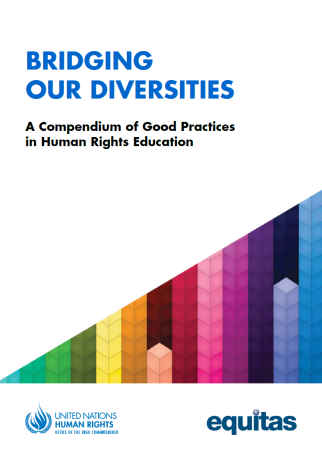ACTIONS
- Protect and safeguard cultural and natural heritage
- Learning and educational opportunities
- Cultural participation/social inclusion
- Sustainable tourism
- Support research
- Employment (recruiting, training, safety)
- Energy consumption, greenhouse gas emissions
- Waste management and reduction
- Transport (forms of, energy use)
- Commercial activities including copyright and IP
- Governance and management
- Security, disaster preparedness, risk reduction
- External partnerships and collaborations
- Publication/report
- Case studies
Bridging our Diversities: A Compendium of Good Practices in Human Rights Education

Intended Audience
“This Compendium is intended to be of use to a wide range of individuals and organizations. These audiences include practitioners and organizations within the human rights education field, and those within global education and academic fields, such as human rights law, political science and sociology. This Compendium also serves as a tool for government authorities and civil society organizations.”
- Office of the United Nations High Commissioner for Human Rights (OHCHR) and Equitas
“Bridging Our Diversities: A Compendium of Good Practices in Human Rights Education compiles lessons learned and good practices in human rights education shared by participants during the Montréal conference. In doing so, the Compendium does not review or cover exhaustively all human rights education work worldwide, but rather focuses on the Canadian experience. Nevertheless, the lessons learned, good practices and examples it contains - the details of which are reliant on information submitted by relevant practitioners - can provide guidance and inspiration to others for further human rights education programming.” (p.7)
Avaiable in
- English
SDGs LINKAGES
The resource is most closely related to SDGs around inclusion and education, including 4.7 (Education for Sustainable Development), 5.1 (gender inclusion), 10.2 (universal inclusion), 11.7 (access to safe and welcoming green and public spaces), 12.8 (education and information for sustainable development and lifestyles in harmony with nature) and 16.10 (protect rights and freedoms). Individual case studies relate to further SDG targets.
Click on the SDG Target to discover Our Collections Matter indicators
-
Our Collections Matter indicators:
- Numbers of people in each type of programme drawing on collections from different demographic groups.
- Increases in numbers of people in each type of programme from different demographic groups.
- Proportion of people involved in such programmes in relation to overall audience size.
- Evidence that learners have acquired knowledge and skills to promote sustainable development.
-
Our Collections Matter indicators:
- Collections development to ensure that collections effectively meet the needs of all, irrespective of sex or gender.
- Number and proportion of educational and participatory programmes that promote participation irrespective of sex or gender.
- Numbers and proportions of girls, women and gender-diverse people making use of collections in relation to the demographic of the local population.
- Numbers and proportions of girls, women and gender-diverse people involved in focused programmes aimed at promoting social, economic and political inclusion.
- Numbers and proportions of girls, women and gender-diverse people from different demographic groups involved in decision-making processes relating to collections and collections-based institutions.
- Number and types of partnerships that build relationships with people of different sex and gender.
-
Our Collections Matter indicators:
- Collections development to ensure that collections effectively meet the needs of all, irrespective of age, sex, disability, race, ethnicity, origin, religion or economic or other status.
- Number and proportion of educational and participatory programmes that promote participation irrespective of social or other status.
- Numbers and proportions of people making use of collections in relation to the demographic of the local population.
- Numbers and proportions of people involved in focused programmes aimed at promoting social, economic and political inclusion.
- Numbers and proportions of people from different demographic groups involved in decision-making processes relating to collections and collections-based institutions.
- Number and types of partnerships that build relationships with marginalized groups, individuals and communities.
-
Our Collections Matter indicators:
- Numbers of people accessing collecting institutions from different demographic groups, notably women, children, older people and persons with disabilities.
- Increases in numbers of people accessing collecting institutions from different demographic groups.
- Measures taken to remove barriers to access green and public spaces.
- Extent of green space provided by collections institutions.
-
Our Collections Matter indicators:
- Extent to which (i) global citizenship education and (ii) education for sustainable development (including climate change education) are mainstreamed in (a) national education policies; (b) curricula; (c) teacher education; and (d) student assessment.
- Extent to which global citizenship education and education for sustainable development (including climate change education) are mainstreamed in formal, informal and non-formal education programmes and activities drawing on and related to collections.
-
Our Collections Matter indicators:
- Adopt and implement constitutional, statutory and/or policy guarantees for public access to information.
- Plans in place, and plans implemented to enhance public access to information relating to collections.
- Plans in place, and plans implemented to support fundamental freedoms, in line with human rights, national and international agreements and legislation.
- Plans and procedures in place for public access to information relating to the operation and management of collections-based institutions.
- Complaint mechanism in place for public to use where public access to information and fundamental freedoms not supported or fulfilled.
